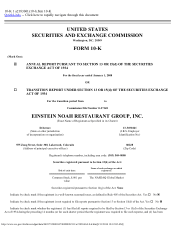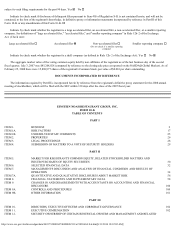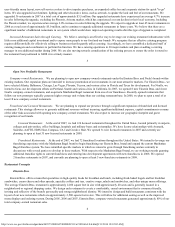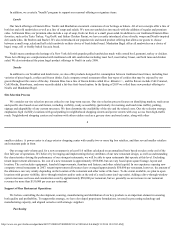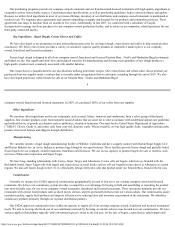Einstein Bros 2007 Annual Report Download - page 10
Download and view the complete annual report
Please find page 10 of the 2007 Einstein Bros annual report below. You can navigate through the pages in the report by either clicking on the pages listed below, or by using the keyword search tool below to find specific information within the annual report.
http://www.sec.gov/Archives/edgar/data/949373/000104746908002111/a2183061z10-k.htm[9/11/2014 10:12:02 AM]
salads. These products are sold either through a private label program or under the Einstein Bros. or Noah's brands.
Distribution
We currently utilize a network of independent distributors to distribute restaurant products to our restaurants. By contracting with distributors,
we are able to eliminate investment in distribution systems and focus our managerial and financial resources on our restaurant operations. We
contract for virtually all food products and supplies for our company-owned restaurant operations (other than Noah's frozen bagel dough),
including cream cheese, coffee, meats and paper goods. Our vendors and commissaries deliver the products to our distributors for delivery to each
restaurant. The individual restaurants order directly from the distributors and commissaries one to three times per week.
10
Quality Control
We have implemented a quality assurance and food safety program that is designed to provide our restaurants and guests with high quality
and safe foods. Quality and food safety programs and procedures include regular and comprehensive vendor and distribution inspections, process
control assessments, food performance and sensory evaluations. The inspections and assessments are based on the federal Hazard Analysis of
Critical Control Points principle and prioritized to monitor those foods that have the most potential for food safety and performance risk.
Furthermore, our quality assurance program has developed a detailed specification and nutritional database that provides our restaurants and guests
with current nutritional information on our menu items.
Supplementing the corporate quality assurance program is our restaurant Quality Service Cleanliness survey that is done by regional training
persons, internal food safety and handling programs for our general managers and our toll-free customer call-in number. All of these measures
provide us with information that is used to assess the effectiveness of our internal quality surveillance programs.
Licensing and Franchising Segment
Licensing and franchising our brands allows us to increase our geographic footprint and brand recognition. We also generate additional
revenues without incurring significant additional expense, capital commitments and many of the other risks associated with opening new company-
owned restaurants.
Licensing
At the end of 2007, we had 124 licensed restaurants throughout the United States located primarily in airports, colleges and universities, office
buildings, hospitals and military bases and on turnpikes. We have license relationships with Aramark, Sodexho, AAFES, HMS Host, Compass,
CA-1 and Creative Host. Our typical license has a five-year term and provides that the licensee pays us an up-front license fee of $12,500 and a
royalty fee of 7.5%. Our licensed restaurants generally have average unit volumes of approximately $445,000. We opened 31 new licensed
restaurants in 2007 and currently are planning to open at least 35 new licensed restaurants in 2008.
Einstein Bros. Franchising
We believe we can more efficiently grow our Einstein Bros. brand through franchising to qualified area developers. As of January 1, 2008, we
are registered to offer Einstein Bros. franchises in all 50 states. During 2007, we actively marketed the Einstein Bros. brand franchise rights and
signed two multi-location deals with two separate parties. The first Einstein Bros. franchise location is expected to open during the first half of
2008.
Unlike past Manhattan Bagel franchises, which were sold as single franchised units, we plan to utilize a franchise area development model for
the Einstein Bros. brand in which we will assign exclusive rights to develop restaurants within a defined geographic region within a specified
period of time. We are targeting franchise area developers who have the existing infrastructure, operational experience and financial strength to
develop several restaurants in a designated market. The franchise agreement requires an up-front fee of $35,000 per restaurant and a 5% royalty
based on gross sales.
We intend to enter into franchise area development agreements in geographic markets where we either currently do not have Einstein Bros.
restaurants or in markets that can support both franchised and company-owned restaurants. In markets where we have limited market penetration,
we may also consider selling existing Einstein Bros. restaurants to a franchise area developer. In these instances, we plan to require the franchise
area developer to open a minimum number of additional restaurants within a designated period of time.
11

